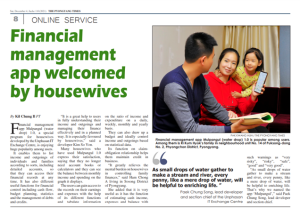Benjamin Katzeff Silberstein
Reports Daily NK:
North Korean authorities recently designated streetside commerce as a “crime against the people” and have begun ideological education efforts to tamper down discontent surrounding government crackdowns on street merchants.
Daily NK recently obtained “political activity materials” written by the Central Committee’s Propaganda and Agitation Department entitled “Let’s Completely Eliminate the Phenomenon of Commerce near Markets and in the Streets.” The materials were used during lectures at factories, enterprises and inminban (people’s units) throughout the country from early to mid-November.
The materials start by saying, “COVID-19 is causing great anxiety and concern in the international community as it spreads throughout the entire world, while the appearance of variants is causing a major global disaster.”
The materials then say that with the authorities declaring a national quarantine emergency and closing the border to stop infections, some “unawake” people were in a flap over “temporary difficulties” and obstructing quarantine efforts by carrying out “chaotic” commerce near markets and on the streets. Essentially, the authorities are stressing the justification for the controls on streetside commerce.
Daily NK previously reported that North Korean authorities — led by the Ministry of Social Security — have strengthened their controls on streetside commerce since March, forcefully confiscating the wares of so-called “grasshopper merchants,” as streetside merchants are called in North Korea. They have gradually strengthened their crackdown since then, dragging off people involved in the trade to forced labor camps.
Despite the “mop-up operation,” however, locals reportedly continue to engage in streetside commerce to overcome economic difficulties brought on by the COVID-19 pandemic, evading surveillance by regulators. People have also expressed considerable bitterness over being prevented from doing business as they like. Aware that people are very unhappy, the authorities have begun ideological education efforts in response.
The materials condemned “many people” for “creating disorder near markets and on the street, failing even to wear masks” and “threatening quarantine efforts by serving food of questionable sanitation and safety,” all out of an obsession with “earning just a few coins more.”
(Source: Kim Chae Hwan, “North Korea calls streetside commerce a ‘crime against the people’,” Daily NK, 6/12/2021.)

